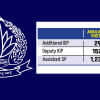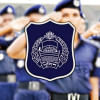Cops still afraid to come out of cocoon

An overarching sense of frustration, apprehension, and opportunism prevails over the police force, rendering it virtually dysfunctional.
Almost two months after the Awami League regime fell, the law enforcers are still hesitant to face the people in the context of its complete loss of credibility and moral authority during the July-August protests and uprising.
While some officers are still apprehensive about their fate due to their role as enthusiastic enablers of the previous regime, other officers, relatively more professional, are simply frustrated as they are being branded villains and tools who perpetuated Awami League's fascism only because they followed orders.
There is yet another group of officers who are desperately trying to portray themselves as victims of the previous regime's extreme partisanship to secure their desired posts, according to insiders.
Since none of these three groups are keen on policing and since the law enforcers are facing a serious lack of logistical support, police appear to be afflicted with inertia.
Even the highway police in many cases have to walk to their designated places or get rides on public transport since protesters had burnt several hundred police vehicles.
The police, which for many is a "force on wheels" as it is supposed to be agile and nimble and able to quickly respond to distress calls, is now largely reduced to a "force behind the desk".
Even the 999 emergency hotline, which allows citizens in distress to ask for immediate police assistance, is struggling.
Before August 5, police used to take 20 to 25 minutes to show up at the spot after a call, but now it takes twice the time and in some cases 2 to 3 hours. Some calls go unanswered even, according to sources.
Regular police drives and patrolling are being hampered due to a lack of vehicles, according to them.
Before and immediately after the ouster of Sheikh Hasina, police faced unprecedented public fury as mobs torched their vehicles and properties and ransacked police facilities in reprisal to the law enforcers' use of excessive force on demonstrators.
According to police sources, over 450 police stations out of 664 were attacked, and some establishments were torched.
At least 500 police vehicles were set on fire. As per Police Headquarters data, 5,829 firearms and 6,06,742 bullets were looted.
Dhaka Metropolitan Police Commissioner Mainul Hasan, at a programme on Saturday, said people lost confidence in police due to the unprofessional activities of a handful of its members.
"This is an irreparable loss for the force. I have taken charge at a different time… we are trying to restore people's confidence in the police …
"I believe that with the joint efforts of all, we will reach a place where police will be a symbol of public confidence," the DMP boss said.
The interim government has formed a commission, led by former home secretary Sarfaraz Chowdhury, to reform the police.
The government has also taken some initiatives to make the force with around 2.13 lakh members fully operational, including holding special meetings, reshuffles, promotions, and repeated call by seniors to perform their duties properly.
Led by DMP Commissioner Mainul Hasan, senior officials of the unit already held two special welfare meetings -- on September 26, and September 28 --- with police officials.
At the meetings, the DMP high-ups took stock of force members' demands and urged them to do their duties upholding the directives of senior officers.
Inspector General of Police Mainul Islam also tried to address the problems by holding meetings with different unit chiefs.
But those initiatives, according to many police members, did little.
Many senior police officers, who were at the forefront during the Hasina-led government, are not appearing publicly any more. Some of them have taken leave.
They are not on the list of 187 officials who have not yet joined work after Hasina fled.
The absentees include one deputy inspector general, seven additional DIGs, two superintendents of police (SP), one additional SP, five assistant SPs, five police inspectors, 14 sub-inspectors, and sergeants, nine assistant sub-inspectors, seven nayeks, and 136 constables.
Home Adviser Lt Gen (retd) Jahangir Alam Chowdhury at a programme yesterday said the policemen who have not joined work yet should be treated as criminals.
According to sources, several police officers left the country to avoid arrest, some police officials attached to different units without given any specific charge are also planning to go abroad, and some are seeking leaves or deputation postings.
Around 1,000 cops are also under treatment for their injuries sustained during the uprising.
With all these going on, many police officials, especially junior ones, now do not want to face the people out in the open and on occasions have refused to follow orders fearing public wrath, according to sources.
Some cops, especially those who were in the limelight during the previous regime, now are content with posts that keep them out of public interactions.
"… This post gave me mental relief... this is an indication that I will not be indicted in any cases," an SP ranked officer recently told The Daily Star after being transferred to a post usually not desired by police officials.
A good number of policemen are unhappy as murder cases were being filed against them. So far 184 murder cases have been filed against cops, including three former inspectors general of police.
Of the cases, 99 have been filed accusing DMP members, sources added.
"We are being accused of murder without any reason, as The Code of Criminal Procedure, 1898, covers our force. By mandate, we are bound to follow the government order, and we do what the government directs us to do. But we are still facing murder charges," a high official of the force requesting anonymity told this newspaper mentioning section 132 of CrPC.
The section says, "No prosecution against any person for any act purporting to be done under this Chapter shall be instituted in any Criminal Court, except with the sanction of the Government."
The official said departmental action can be taken against police officers accused of making mistakes and using excessive force.
On the inactiveness of law enforcers, former IGP Muhammad Nurul Huda told The Daily Star that police suffered a huge blow with the fall of Hasina-led government and that it would take time to recover. But the recovery speed was poor, he said.


 For all latest news, follow The Daily Star's Google News channel.
For all latest news, follow The Daily Star's Google News channel. 








Comments